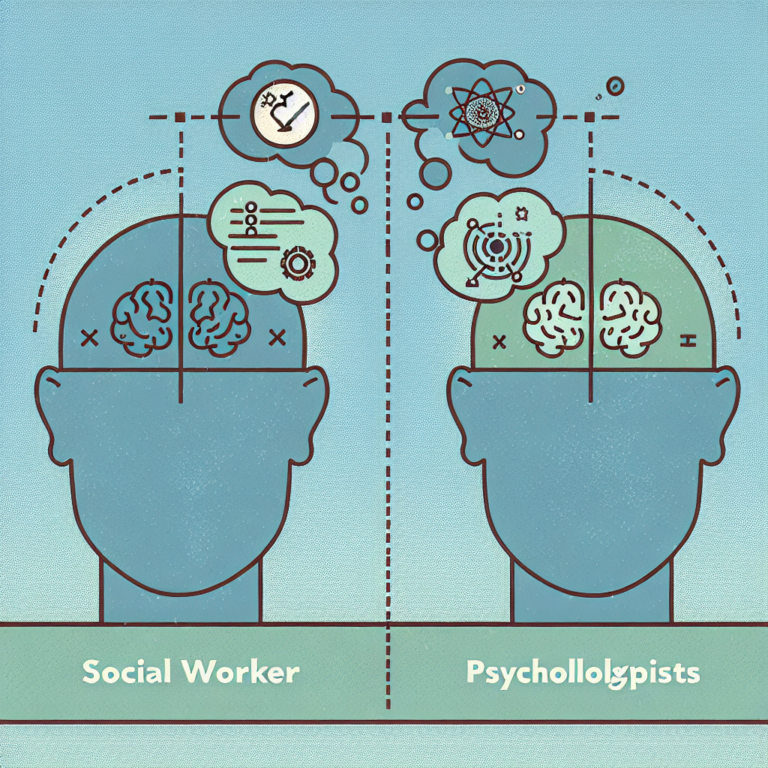
Introduction
In today’s fast-paced world, mental health has become a crucial topic for individuals, families, and communities alike. As the stigma surrounding mental health continues to diminish, more people are seeking professional help. However, this leads to a pivotal question: Social Work vs. Psychology: Choosing the Right Path for Mental Health Advocacy. Both fields equip professionals to tackle mental health issues but approach them from different angles. Understanding each discipline’s framework, strengths, and applications can empower you to make informed decisions about your career path or the type of support needed.
Understanding the Disciplines
What is Social Work?
Social work is a profession focused on helping individuals, families, and communities enhance their well-being. Social workers often engage in advocating for social justice, providing therapy, and connecting clients with essential resources. They are typically licensed and possess specialized training in areas such as:
- Clinical social work: Provides therapy and mental health support.
- Community organization: Works on broader societal changes.
- Policy advocacy: Engages in reforming social systems.
What is Psychology?
Psychology, on the other hand, is more focused on understanding, diagnosing, and treating mental and emotional disturbances. Psychologists conduct research, perform assessments, and provide therapeutic interventions. Key areas within psychology include:
- Clinical psychology: Focuses on diagnosing and treating mental disorders.
- Counseling psychology: Aims to improve well-being and resolve crises.
- Research psychology: Studies behaviors and mental processes to inform practice.
Both disciplines are framed by a commitment to mental health advocacy, yet they diverge significantly in methods, goals, and training.
Comparing the Education and Training
| Aspect | Social Work | Psychology |
|---|---|---|
| Degree Required | Master of Social Work (MSW) | Doctor of Psychology (PsyD or PhD) |
| Focus | Community impact, resource access | Individual diagnosis, therapies |
| Licensing | Licensed Clinical Social Worker (LCSW) | Licensed Psychologist (LP) |
| Duration | 1-2 years post-bachelor’s | 4-7 years post-bachelor’s |
Case Study: Jenna’s Journey
Jenna, a young mother facing depression, sought help from both a social worker and a psychologist. The social worker assisted her in applying for benefit programs, while the psychologist provided her with cognitive behavioral therapy (CBT). This dual approach demonstrates how both disciplines can collaborate to provide comprehensive mental health support.
Analysis
This case emphasizes that mental health advocacy often requires multidisciplinary approaches. A social worker can improve clients’ circumstances, while a psychologist can offer therapeutic interventions. Their cooperation can yield more effective outcomes in mental health treatment.
Roles in Mental Health Advocacy
Social Workers in the Field
Social workers play vital roles in mental health advocacy through:
- Crisis intervention: Providing immediate support during emergencies.
- Advocacy: Working on behalf of clients to secure needed services.
- Education: Raising awareness on mental health issues in communities.
Psychologists in the Field
Psychologists contribute to mental health advocacy by:
- Conducting research: Uncovering patterns and best practices in mental health.
- Therapeutic practices: Helping individuals process and cope with mental health issues through various treatment modalities.
- Policy contribution: Influencing laws and policies related to mental health on macro levels.
The Collaborative Potential
The Power of Interdisciplinary Teams
When social workers and psychologists collaborate, they create a holistic environment for addressing mental health. For instance, interdisciplinary teams in rehab centers blend therapy (from psychologists) and social support (from social workers), leading to better recovery rates for patients.
Case Study: The Rehabilitation Center
A rehabilitation center comprised a multidisciplinary team that included social workers and psychologists. Their combined efforts enabled more tailored treatment plans addressing both internal psychological issues and external social barriers. Patients noted higher satisfaction and better overall mental health outcomes.
Analysis
This example illustrates how the partnership between these two professions amplifies their impact. It highlights the importance of addressing both mental health and social factors to achieve lasting change.
Choosing the Right Path
Personal Interests and Strengths
When considering Social Work vs. Psychology: Choosing the Right Path for Mental Health Advocacy, reflect on your strengths:
- If you have a passion for community engagement and advocacy, social work may be your calling.
- If you enjoy in-depth analysis and therapeutic interactions, psychology may be the better fit.
Career Opportunities
Both paths offer diverse career opportunities:
Social Work Opportunities
- Clinical Social Worker
- School Social Worker
- Policy Analyst/Advocate
Psychology Opportunities
- Clinical Psychologist
- Research Psychologist
- Forensic Psychologist
Exploring these options allows you to align your career trajectory with your personal goals and interests.
Conclusion: A Unified Approach to Mental Health Advocacy
As we dive deep into Social Work vs. Psychology: Choosing the Right Path for Mental Health Advocacy, it becomes clear that both fields offer unique solutions to complex mental health challenges. They often overlap but remain distinct in their approaches. When choosing a path, consider not just your personal interests, but the value that collaboration between these disciplines can bring to individual and community mental health.
Whether you become a social worker or psychologist, remember that advocacy can take many forms. You can drive social change, conduct vital research, or offer compassionate care. Ultimately, the most significant work lies in the heart—advocating for those who struggle and need support.
FAQs
1. What is the main difference between social work and psychology?
Social work focuses on social justice and community resources, while psychology centers on diagnosing and treating mental health disorders.
2. Can social workers and psychologists work together?
Absolutely! Collaborative efforts between both professions can provide comprehensive support, addressing both mental health and social challenges.
3. What kind of clients do social workers typically work with?
Social workers often engage with individuals facing various challenges, including mental health issues, poverty, and family crisis, among others.
4. What is the typical educational path for a psychologist?
Psychologists generally require a bachelor’s degree, followed by a doctorate (PsyD or PhD) in psychology, which can take an additional 4-7 years to complete.
5. Are there job opportunities for both social workers and psychologists?
Yes, both fields have numerous job opportunities across schools, hospitals, clinics, and community organizations, making them both viable career paths.
Ultimately, whether you lean toward social work or psychology, both paths contribute significantly to mental health advocacy. Your decision may shape not just your career, but the lives of countless individuals seeking support.















